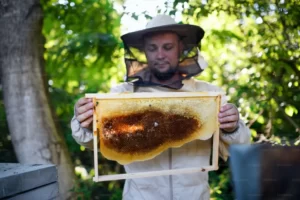Table of Contents
Manuka honey is a natural remedy that has been used for centuries to treat various ailments. It is derived from the nectar of the Manuka flower, which is native to New Zealand. Manuka honey is known for its antibacterial properties and has been found to be effective in promoting wound healing. In recent years, it has gained popularity as a treatment for surgical wounds. In this article, we will explore the benefits of using Manuka honey for surgical wounds and how to properly apply it.
The Benefits of Manuka Honey for Surgical Wounds
Manuka honey has several properties that make it beneficial for treating surgical wounds. Here are some of the key benefits:
-
Antibacterial Properties: Manuka honey contains a compound called methylglyoxal (MGO), which has strong antibacterial properties. It can help prevent infection in surgical wounds by killing bacteria on the skin.
-
Anti-inflammatory Effects: Surgical wounds often result in inflammation, which can delay the healing process. Manuka honey has anti-inflammatory properties that can help reduce swelling and promote faster healing.
-
Moisture Retention: Manuka honey creates a moist environment when applied to a wound, which is essential for optimal wound healing. It helps to keep the wound hydrated and prevents it from drying out.
-
Wound Debridement: Manuka honey has a natural enzymatic action that can help remove dead tissue and debris from the wound. This process, known as wound debridement, is crucial for proper wound healing.
-
Promotes Granulation Tissue Formation: Granulation tissue is the new tissue that forms during the healing process. Manuka honey has been found to promote the formation of granulation tissue, which helps to close the wound.
How to Use Manuka Honey for Surgical Wounds
Before applying Manuka honey to a surgical wound, it is important to clean the wound thoroughly with a saline solution or sterile water. This will help remove any debris or bacteria from the wound.
Once the wound is clean, you can apply a thin layer of Manuka honey directly to the wound. Make sure to cover the entire wound with the honey. If the wound is deep, you may need to use a sterile dressing to keep the honey in place.
It is recommended to change the dressing and reapply the Manuka honey at least once a day. If the wound is heavily exuding or infected, you may need to change the dressing more frequently.
Precautions and Considerations
While Manuka honey is generally safe to use on surgical wounds, there are a few precautions and considerations to keep in mind:
-
Consult with Your Doctor: Before using Manuka honey on a surgical wound, it is important to consult with your doctor or surgeon. They can provide guidance on whether it is appropriate for your specific wound and how to properly apply it.
-
Allergies: Some individuals may be allergic to honey. If you or the patient has a known allergy to honey, it is best to avoid using Manuka honey on the surgical wound.
-
Quality of the Honey: Not all Manuka honey is created equal. The effectiveness of Manuka honey for wound healing is directly related to its MGO content. Look for Manuka honey with a high MGO rating (preferably above 400) for optimal results.
-
Storage and Shelf Life: Manuka honey should be stored in a cool, dry place away from direct sunlight. It has a long shelf life, but it is important to check the expiration date before using it on a wound.
-
Avoid Contamination: To prevent contamination, always use a clean spoon or spatula to scoop out the honey. Avoid touching the wound directly with your fingers or the spoon.
Conclusion
Manuka honey has been found to be an effective and natural remedy for promoting wound healing, including surgical wounds. Its antibacterial properties, anti-inflammatory effects, and ability to promote granulation tissue formation make it an ideal choice for treating surgical wounds. However, it is important to consult with your doctor or surgeon before using Manuka honey on a surgical wound, as they can provide specific recommendations based on your individual situation. With proper care and application, Manuka honey can help speed up the healing process and improve the overall outcome of your surgical wound.



